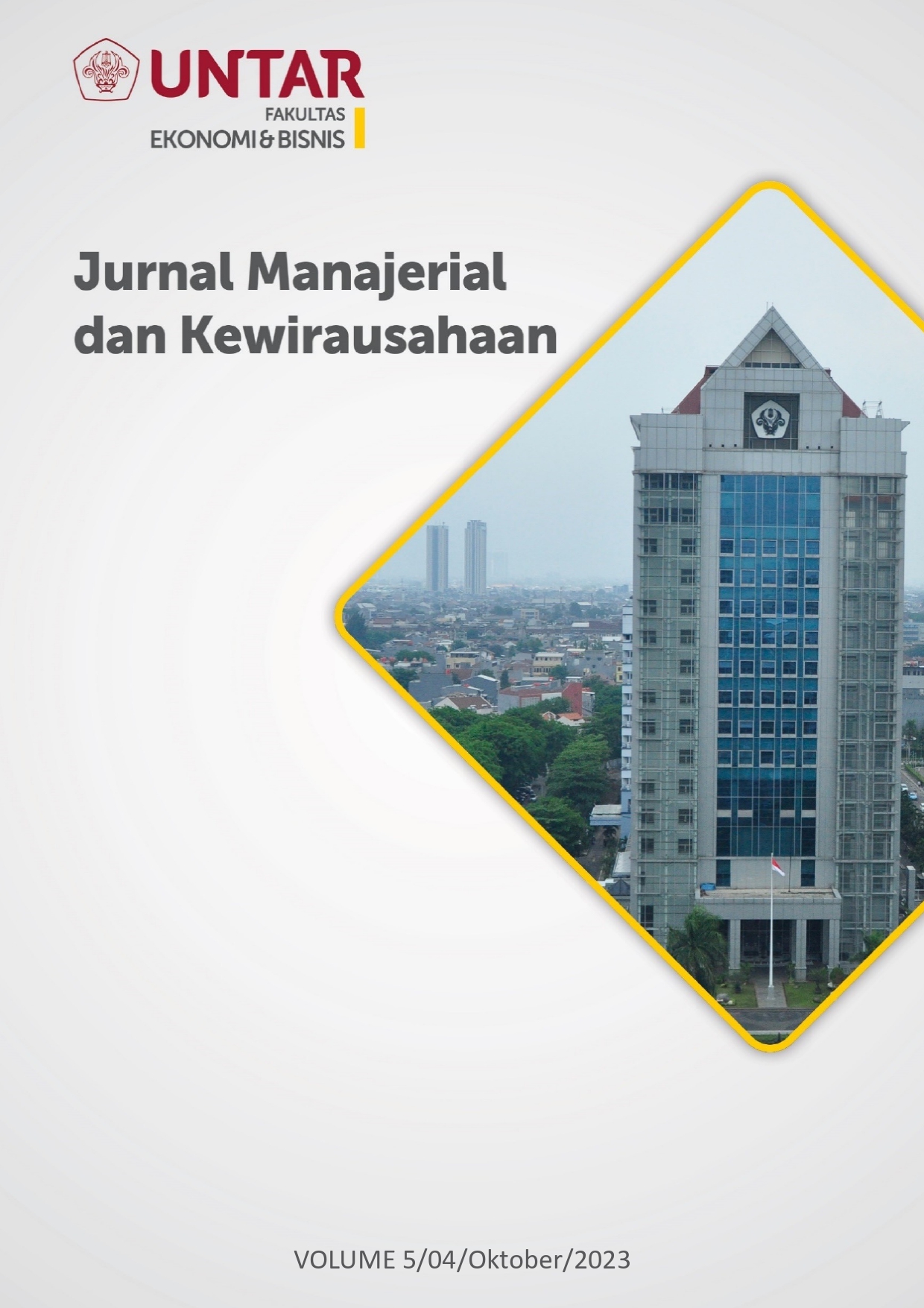Faktor-Faktor yang Mempengaruhi Minat Berwirausaha Generasi Z di Jakarta
Main Article Content
Abstract
Penelitian ini dilakukan untuk menguji Pengaruh locus of control, Kebutuhan akan Prestasi, Toleransi Risiko dan Kesigapan Berwirausaha Terhadap Minat Berwirausaha pada Generasi Z di Jakarta, Menggunakan metode penelitian deskriptif yang diolah dengan Smart Partial Least Square (SPLS). Jumlah sampel yang digunakan dalam penelitian sebanyak 100 responden generasi z yang saat ini sedang menempuh pendidikan di tingkat SMA dan Perguruan Tinggi di Jakarta. Hasil penelitian menunjukan bahwa (1) Locus Of Control berpengaruh positif terhadap minat berwirausaha, (2) Kebutuhan Akan Prestasi berpengaruh positif terhadap minat berwirausaha, (3) Toleransi Risiko berpengaruh positif terhadap minat berwirausaha, (4) Kesigapan Berwirausaha berpengaruh positif terhadap minat berwirausaha.
This research was conducted to examine the Influence of Locus of Control, Achievement Need, Risk Tolerance, and Entrepreneurial Readiness on Entrepreneurial Interest among Generation Z in Jakarta, using a descriptive research method processed with Smart Partial Least Square (SPLS). The sample size used in the study consisted of 100 respondents from Generation Z who are currently pursuing education at the high school and college levels in Jakarta. The research results indicate that (1) Locus of Control has a positive influence on entrepreneurial interest, (2) Achievement Need has a positive influence on entrepreneurial interest, (3) Risk Tolerance has a positive influence on entrepreneurial interest, and (4) Entrepreneurial Readiness has a positive influence on entrepreneurial interest.
Article Details
Section

This work is licensed under a Creative Commons Attribution-NonCommercial-ShareAlike 4.0 International License.
This work is licensed under a Jurnal Muara Ilmu Ekonomi dan Bisnis Creative Commons Attribution-ShareAlike 4.0 International License.,/p>
References
Ajzen, I. (1991). The Theory of Planned Behavior. organizational behavior and human decision processes, 50, 179–211.
Akmaliah, Zaidatol, & Lope Pihie. (2020). Entrepreneurship as a Career Choice: An Analysis of Entrepreneurial Self-Efficacy and Intention of University Students. European Journal of Social Sciences, 9.
Asmuruf, T. A., & Soelaiman, L. (2022). Entrepreneurship Intentions Among Vocational School Students In Sorong Regency - West Papua. Advances in Social Science, Education and Humanities Research, 1301-1306. https://doi.org/10.2991/assehr.k.220404.208
Caliendo, M., Fossen, F., & Kritikos, A. S. (2014). Personality characteristics and the decisions to become and stay self-employed. Small Business Economics, 42(4), 787–814. https://doi.org/10.1007/s11187-013-9514-8
Chavoushi, Z. H., Zali, M. R., Valliere, D., Faghih, N., Hejazi, R., & Dehkordi, A. M. (2021). Entrepreneurial alertness: a systematic literature review. Journal of Small Business and Entrepreneurship, 33(2), 123–152. https://doi.org/10.1080/08276331.2020.1764736
Dwi Hadya Jayani. (2021). Pengangguran Indonesia Kini Ada 9,1 Juta Orang, Turun Tipis dari Tahun Lalu https://databoks.katadata.co.id/datapublish/2021/11/05/pengangguran-indonesia-kini-ada-91-juta-orang-turun-tipis-dari-tahun-lalu
Islam, T. (2019). Cultivating Entrepreneurs: Role of the University Environment, Locus of Control and Self-efficacy. Procedia Computer Science, 158, 642–647. https://doi.org/10.1016/j.procs.2019.09.098
Karimi, P., Kloshani, M., & Bakhshizadeh, A. (2012). A comparative study on emotional intelligence and cognitive between successful and unsuccessful entrepreneurs. Management Science Letters, 2(6), 2071–2076. https://doi.org/10.5267/j.msl.2012.06.013
Ng, P. Y., & Clercq, D. de. (2021). Explaining the entrepreneurial intentions of employees: The roles of societal norms, work-related creativity and personal resources. International Small Business Journal: Researching Entrepreneurship, 39(8), 732–754. https://doi.org/10.1177/0266242621996614
Paul, J., & Shrivatava, A. (2016). Do young managers in a developing country have stronger entrepreneurial intentions? Theory and debate. International Business Review, 25(6), 1197–1210. https://doi.org/10.1016/j.ibusrev.2016.03.003
Sigit Kurniawan. (2015). Alasan Wirausaha Sulit Berkembang di Indonesia. https://marketeers.com/.https://marketeers.com/alasan-wirausaha-sulit-berkembang-di-indonesia
Soelaiman, L., Puspitowati, I., & Selamat, F. (2022). Peran Model Panutan Terhadap Intensi Berwirausaha Mahasiswa melalui Penerapan Teori Perilaku Terencana. Jurnal Muara Ilmu Ekonomi dan Bisnis, 6(2), 320-329. https://doi.org/10.24912/jmieb.v6i2.20387
Vika Azkiya Dihni. (2022). Pengangguran Anak Muda RI Tergolong Tinggi di Asia Tenggara. https://databoks.katadata.co.id/
Widjaya, O. H., Budiono, H., Wiyanto, H., & Fortunata, F. (2021). The Effect of Locus of Control, Need for Achievement, Risk Tolerance, and Entrepreneurial Alertness on the Entrepreneurial Intention. Advances in Social Science, Education and Humanities Research, 177-184. https://doi.org/10.2991/assehr.k.210805.029
Zapkau, F. B., Schwens, C., Steinmetz, H., & Kabst, R. (2015). Disentangling the effect of prior entrepreneurial exposure on entrepreneurial intention. Journal of Business Research, 68(3), 639–653. https://doi.org/10.1016/j.jbusres.2014.08.007

